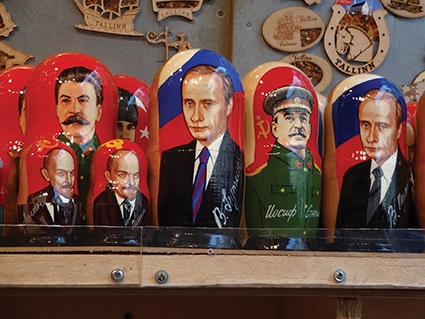Explaining Stalin’s Popularity Through Putin
Op-Ed
Loving one’s own history brings a remarkable feeling. Victorious battles, military campaigns and progress in the scientific realm are most quoted. However, there are political figures or events which cause an ambivalent reaction. In Georgia, many remember the 17th century politician-general Giorgi Saakadze in the same way France remembers Napoleon. For Georgia’s northern neighbor, Russia, such a figure is communist leader Joseph Stalin. What differentiates the Russian case from almost all others is that in Russia the popularity of Stalin very much depends on the overall political climate inside the country and the agenda of Russian politicians. The current attitudes towards Stalin highlight those deep problems Russia is experiencing today: pressure from the West, economic troubles, Putin’s long rule, and the need for internal consolidation. All these processes are of great importance as they directly influence Russia’s foreign policy towards its neighbors.
Surprisingly, the Russian government is still unsure how to approach the Stalin epoch. It was under him that the Soviet Union won World War II, but it was also during his rule that millions died or were displaced. Russian school books at times provide a less than full picture of Stalin’s rule and the wording is changed almost annually to adjust to the existing political atmosphere.
Recently, Stalin’s popularity has grown significantly, with survey results showing it at a 16-year high. For instance, according to the Levada Center pollster from February this year, almost 46 percent of respondents viewed the Soviet leader positively, while only 21 percent hated or feared him. 22 percent described themselves as merely “indifferent”. 32 percent of Russian respondents said they looked upon Stalin “with respect” while 10 percent said that they had “sympathetic views” and 4 percent looked upon the leader with “admiration”.
In April, according to the same Levada Center pollster, Stalin was named by Russians as the world's most outstanding public figure. Approximately 1,600 Russians were asked to name ten of the world's greatest personalities and Stalin came first, gaining 38%. He was followed by the Russian poet Alexander Pushkin and President Vladimir Putin (both up 34%).
Stalin’s popularity is now reaching the top echelon of the Russian government. In a June interview, Putin criticized the “excessive demonization of Stalin” as a reaction to the fact that many Russians have tried to preserve the memory of Stalin's victims.
Indeed, the attitudes of Russian state institutions are changing and a good example of this would be the silence from the government on July 30 – the 80th anniversary of the launch of purges known as the Great Terror. The Russian government in fact staged some celebrations, but only for the annual Navy Day holiday. No official commemorations were made to mark Soviet government secret police head Nikolai Yezhov’s Order No. 00447, which initiated the terror.
This silence is very symptomatic of Russian society's ambivalent understanding/perception of Stalin’s rule and particularly of the Great Terror. As a reflection, a recent opinion poll by the All-Russia Center for the Study of Public Opinion (VTsIOM) showed that a staggering 43 percent of Russians think that Stalin’s repressive measures were necessary “to maintain order in the country”.
Putin’s preparations
Putin is experiencing a pretty tough period in his career. Foreign resistance to his foreign policy has worked successfully thus far, seeing Russia more or less isolated. Internally, there are some serious issues regarding Putin’s rule and it is getting more and more difficult for the Russians to understand why his presidency should go on so long. Next year, Putin’s rule will become the longest (17 years) since Stalin’s. There is already an entire generation of young Russians which have seen only Putin as their country’s leader. And this is very problematic for the Russian government as there is an ever-higher proportion of opposition-minded people in Russian society: for example, it was the younger generation which was most active in the country-wide protests earlier this year.
Although Putin is likely to run for presidency in next year’s elections, he has yet to find a platform on which to run. And this platform is not economic or social as in European countries, but psychological. He could explain his participation by the need to oppose a unified Western front in Russia, but many Russians think that the warming to western ideas is due to Putin’s unsuccessful foreign policy anyway. Other platforms such as a struggle against terrorism and separatism would not work this time as they did before.
And hence the growth of Stalin’s cult. Stalin ruled longer than Putin has and state centralization reached its highest point under him. Putin simply does not want to criticize Stalin’s rule as it will be more difficult for him to explain his plans to stay in power for yet another six years. Thus, in Russia, even Stalin’s memory is at the mercy of wider political agendas.
Emil Avdaliani












